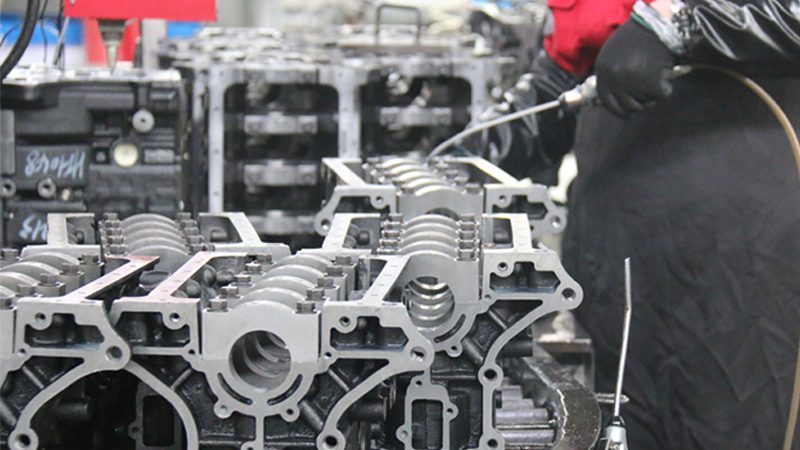Car engine is the power source of your vehicle and it’s considered as the heart of the car. The most recent car engines are a complex combination of electrical and mechanical parts. These parts working together is a perfect synchronization to deliver a combination of high output power and fuel efficiency.
To keep getting the best out then, you need to do car engine tune-up. Our guide covers all essentials for tune-up for cars, answering questions like What’s included in a car tune-up? What happens during a vehicle tune-up? and How do I know if my car needs one?
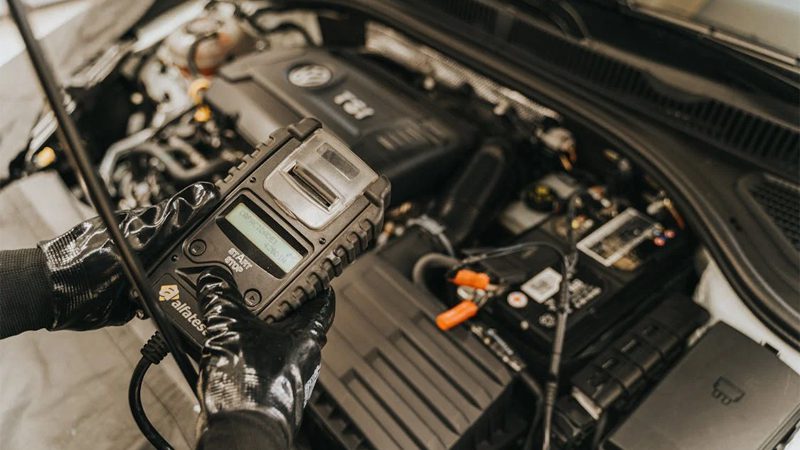
What is a Car Tune-Up?
The car engine tune-up is basically a set of maintenance tasks that are performed on a car engine. These tasks are done to ensure that engines remain efficient and reliable. The vehicle tune-up involves checking, adjusting, cleaning, and replacing different engine parts.
The term tune-up when associated with the engine also means to adjust and fine tune certain engine parts to achieve any specific goal. The goal can be to increase power by compromising fuel efficiency, or increasing fuel efficiency by giving up power. It can also be done to have the best possible combination of both as well.
The car engine tune-up done after fixed intervals regularly has a very positive effect on engine life and will help prevent any sudden costly engine repairs.
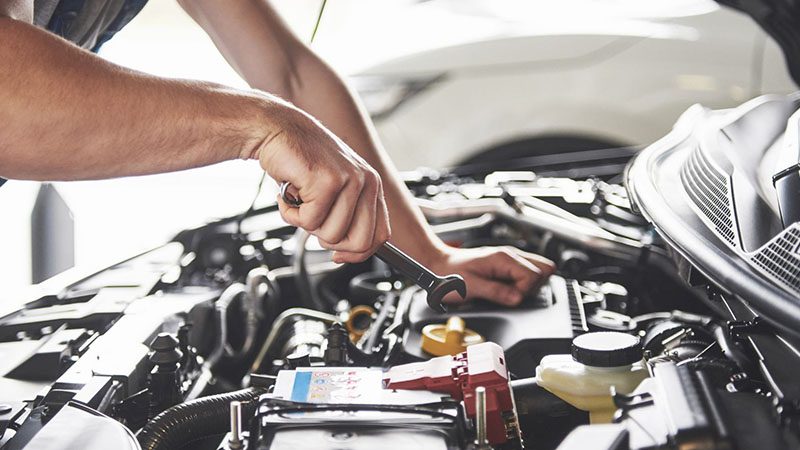
What Does a Car Tune-Up Consist Of?
It depends on what you want from your car engine. The car tune-up can consist of any one or combination of any of the following.
- Spark plug inspection & spark plug replacement
- Ignition system check
- Air filter replacement
- Fuel filter replacement
- PCV valve check
- Timing & idle adjustment (for older vehicles)
- Battery performance test
- Fluid top-offs and inspection
- Engine diagnostics (scanning error codes)
- Belts and hoses inspection
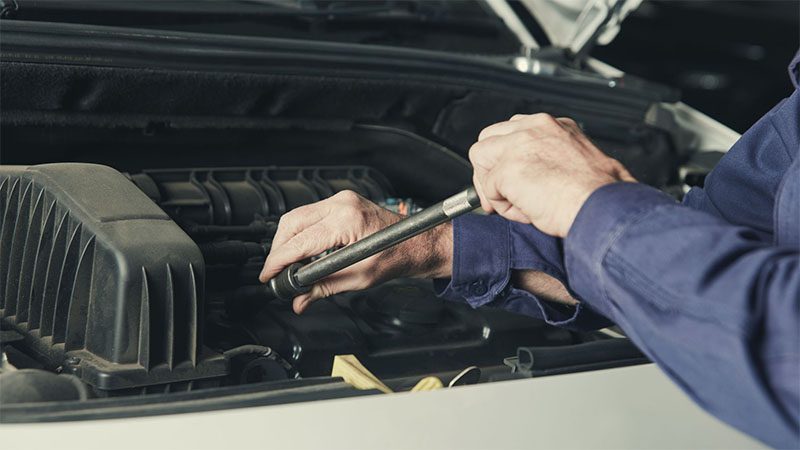
Cars that were designed and built on and before the 1980s, there was not much electrical and electronics involved in their engine working mechanism. So their engine tune-ups were quite different from what today’s tune-ups for cars involves.
Back then the mechanic had to manually perform almost the entire tune-up. Mechanic has to manually adjust engine timing and throttle valve. He has to clean, inspect and then adjust or replace fuel injectors and have to manually clear the engine valves. In a detailed tune-up mechanic also has to work on CB point, condenser, and even clean the car carburetor.
As of today, the engine involves electronic fuel injectors, engine control modules, and a lot of sensors. Sensors like cam position sensor, throttle body sensor, fuel and air intake sensor work to monitor and control their respective aspects of engine working.
So in today’s engine tune-up mechanic has to inspect and clean spark plugs, fuel filter, and do scanning to look for related engine trouble codes. Most sensor tune-up work is done using scanner and laptop with very little manual adjustment needed.

Signs Your Car Needs a Tune-Up
There is no specific light or warning code that tells you to perform the tune-up for car. However there are three certain signs that indicate problems with engine parts or need of maintenance and tune-up of the engine.
Check Engine Light is On
Each and every car present on the road today has an engine control unit, the ECU. It works to monitor engine working and indicate through a check engine light when there is something wrong with the engine.
What check engine light actually means in your car depends on the car make and model. It can either mean a loose gas cap or can indicate a failing sensor. However, one thing is sure for each car make and model and that is, if you ignore check engine light, it can lead to some costly repair in near future.
If you get this light, scan your car ECU with an automotive engine scanner. It will successfully detect your check engine light problem, 90 % of the time through related error code. Mechanics can then perform related tune-ups to remove the error code. The remaining 10% can be detected when others combine with other signs.
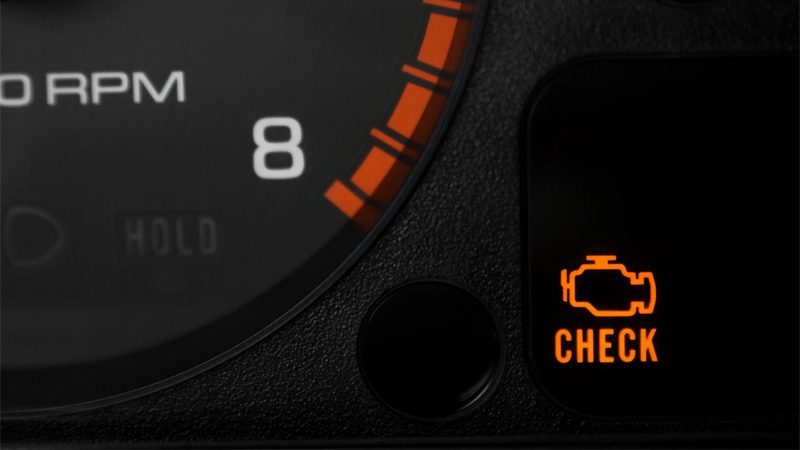
Unusual Noises or Vibrations
Even today, the power generating and delivering mechanism of internal combustion engines is mechanical based. So the unusual noises and vibration from the engine are a common sign that your car engine needs a tune-up.
Eight different and common engine unusual noises and vibrations are as follows.
- The engine knocking and pinging sound. This sound is mostly caused due to use of poor quality fuel, incorrect ignition timing, or due to carbon buildup inside the engine combustion chamber.
- The squealing sounding coming from the engine usually means a worn out engine timing belt or alternator belt.
- The ticking or tapping noise from the engine compartment means four things.
- Low engine oil
- Bad oil filter
- Damaged oil pump
- Damaged engine valve
- Any type of metal grinding noise means damaged parts. It can be from the start motor, transmission or engine itself.
- The popping noise or engine backfire usually means faulty ignition system or problem with fuel delivery system.
- If you get hissing noise from your car engine, then it usually means there is a leak in the engine intake, exhaust, or cooling system.
- Vibration from engine during startup of idling means worn out starter motor gear, misfiring cylinder or problem in fuel delivery.
- If you observe vibration during acceleration then there is a problem with the drivetrain.
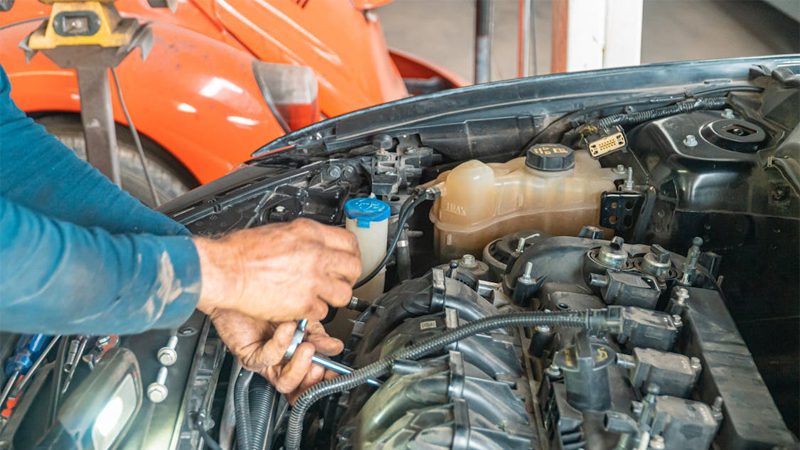
Decreased Fuel Efficiency
One of the most prominent signs that there is something wrong with your car engine is the decreased fuel efficiency of your car engine. With problematic parts, the working of the engine will be compromised. With reduced efficiency, the first sign will be the decrease in miles per gallon MPG of your engine.
Tune Up Services
Oil and Air Filter Replacement
If you feel that your car is lagging whether its at high acceleration or in car AC performance. Then there might be an issue with its air filter. There is one air filter for the car engine and one air filter for the car HVAC system. You might need to replace appropriate or both air filters during car tune up as both air filter work almost equally.
There is also an oil filter in the car and if your engine is showing signs of overheating. Then there might be a clogged oil filter blocking oil flow in the engine.
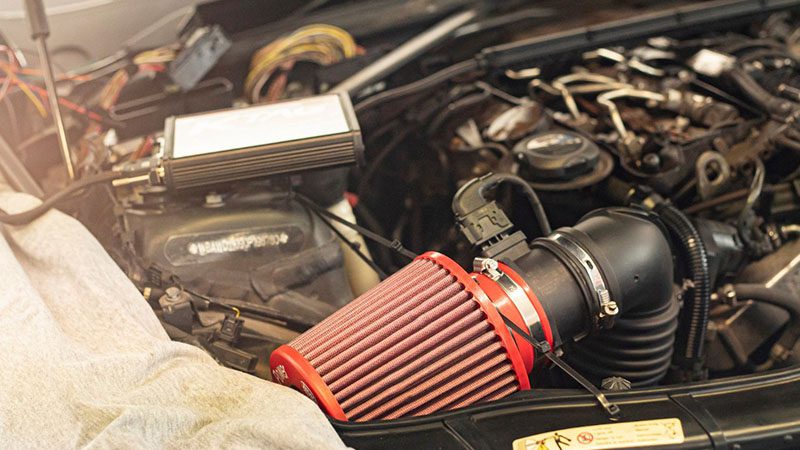
Fuel Filter and Injector Maintenance
In IC engines with multiple cylinders that ignite in a specific pattern, a complete fuel injection system is installed to deliver fuel efficiently. The system consists of a fuel filter, pump, fuel lines, and injectors.
There are sensors installed at each point to monitor the system. If you feel loss of power at high speed then there might be a problem in the fuel filter or delivery system and it might need to be tuned up.
This system can get clogged due to impurities in fuel and might need cleaning or replacement depending on the situation.
Spark Plug and Ignition System Inspection
The spark plug and ignition system works in perfect synchronization with the injection system. The spark plug needs to ignite the fuel at the right time to deliver the highest possible power. If spark plug or these system synchronization gets off, engine tune-up will be required to prevent the engine from any type of permanent damage.
The spark plug also also gets carbon build up that can seriously affect its working and performance. Mechanics need to clean, inspect, and replace spark plug during schedule maintenance. Each cylinder has its own spart plug so you need to check for each spark plug separately.
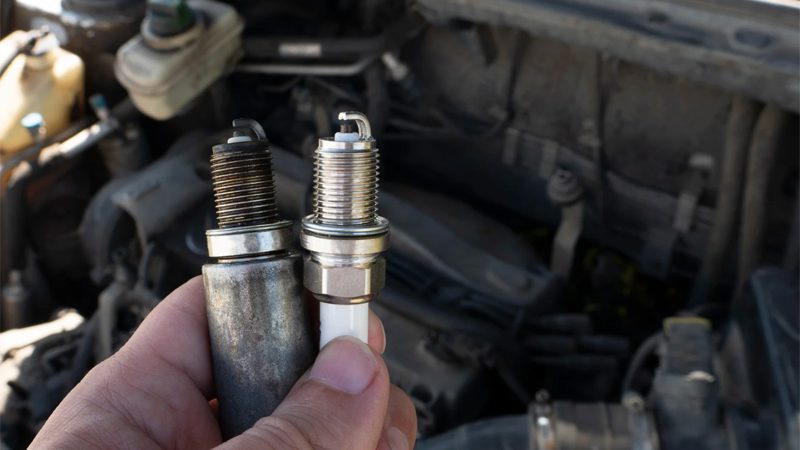
Sensor Replacement and Calibration
There is one sensor for almost each part of your car engine. There are sensors for each part of your car fuel system, ignition system, and each internal part of the engine like cam and valves.
These sensors are very important for vehicle performance and efficiency but they get damaged very easily. The mechanic needs to inspect each sensor using a scanner during scheduled maintenance and do the necessary replacement.
After replacement, these sensors need proper calibration for proper integration with the existing engine ECU. Otherwise, your car engine might malfunction and you can face problems like a warning light showing for no reason or getting a false reading from the speedometer or from gauges like fuel and tire pressure gauge.
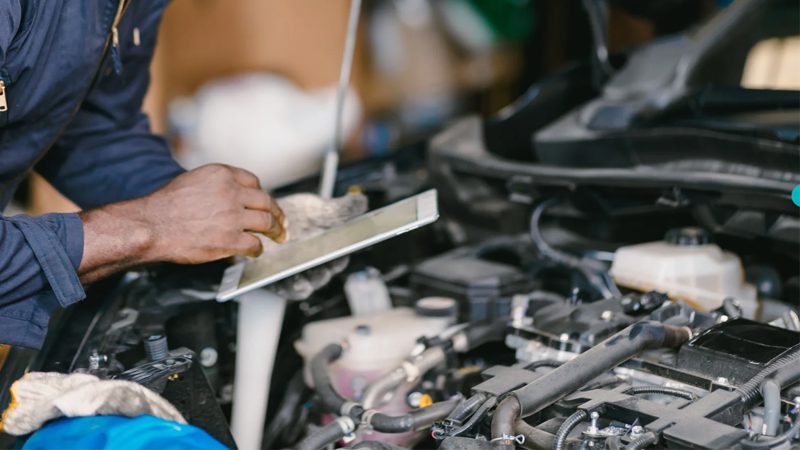
ECU Relearn and Tune-Up
Performance of all cars we have now, heavily relies on the information provided by different sensors to the ECU or power control module PCM. If you remove any sensor for cleaning or replace it with a new one, your car ECU might not integrate it back.
When you complete the process, you need to relearn your car ECU or PCM. The ECU also controls the flow of fuel, air, and the ignition timing, so if you are facing a problem with your car engine after some maintenance. You might need to relearn your ECU or tune-up for car. This all can be done simply by using an automotive scanner.
Fluid Levels and Condition
Your car relies on engine oil, engine coolant, radiator fluid, transmission oil, and brake fluid to perform efficiently. It is your mechanic’s responsibility to check and top up the fluid levels of all types of fluids specially brake fluid.
You will get a warning light on your car dashboard if your car has a low level of any of the above mentioned fluid but it might cause serious damage by the time you notice or get to a workshop.
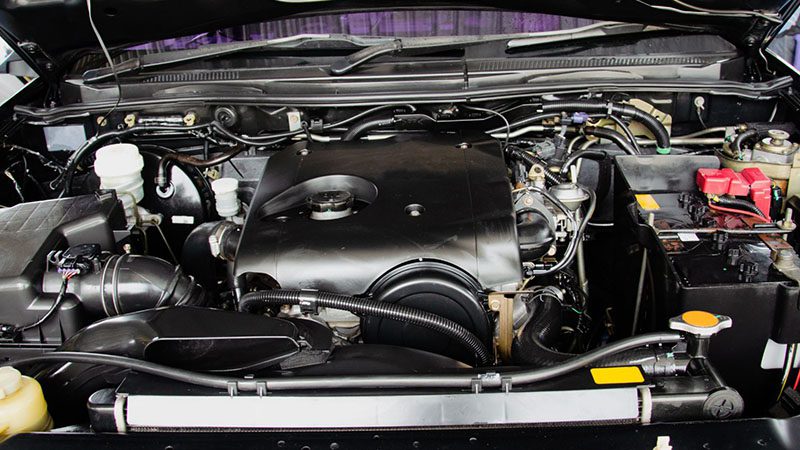
Benefits of a Car Tune-Up
- Keep your engine smooth and powerful as per your requirements.
- Delivers the best fuel efficiency possible, if you tune up for high mileage.
- Prevent major and costly repairs thus saving you money in the long run.
- Extend your car engine life to the maximum.
- Helps you reduce your car carbon and harmful gasses emission and keep the environment clean.
- Help you identify small issues early that can cause major problems during a long drive.
Frequency of Tune Ups
Manufacturer’s Recommendation
Each car manufacturer issues its own recommendation about its engine tune-ups. New cars have to follow the recommendation during the break-in period of the engine to keep the warranties and guarantees of the engine parts.
Each car make and model has its own recommendation of number of miles or months whichever came first for first few tune-ups. Then it’s usually the number of miles after which you should tune up to keep the engine performance as per standards.
Driving Conditions
After the break-in period, you can set the frequency of tune-up for the car based on your driving conditions and style. If you drive in extreme hot weather, then regular maintenance and top ups of all fluid levels after short intervals is recommended. Similar goes for heavy traffic driving conditions.
If you frequently go off road, or do drag racing then, you should consult experts about frequency of your car engine tune-ups.

Cost of a Tune-Up
Your car engine tune-up cost will vary depending on the following factors.
- Your engine make and model
- Type of tune-up required
- Condition of the car
- Mileage after which tune-up is done
- Number of parts needed
- OEM parts cost
- Diagnostic tests needed
- Labor cost in your region
Conclusion
Schedule engine tune up is necessary to keep the engine performance. The specific services and costs will vary based on your car’s condition and needs.
Regardless of the type or cost, tune-ups provide significant benefits—so it’s important to stay on top of your engine’s maintenance schedule.
Follow Up
Nanjing Woda Auto Technology Co., Ltd. is a global leading company offering high-quality auto engine parts, including but not limited to camshafts, crankshafts, cylinder heads, turbochargers, and oil pumps.
With our commitment to excellence in precision engineering and competitive pricing, we supply engine parts to B2B customers in over 100 countries.
Our strong investment in R&D, combined with extensive export experience, makes us a trusted partner for businesses seeking durable and efficient automotive components.
Ready to elevate your inventory with top-tier engine parts? Contact us today to explore new business opportunities.
